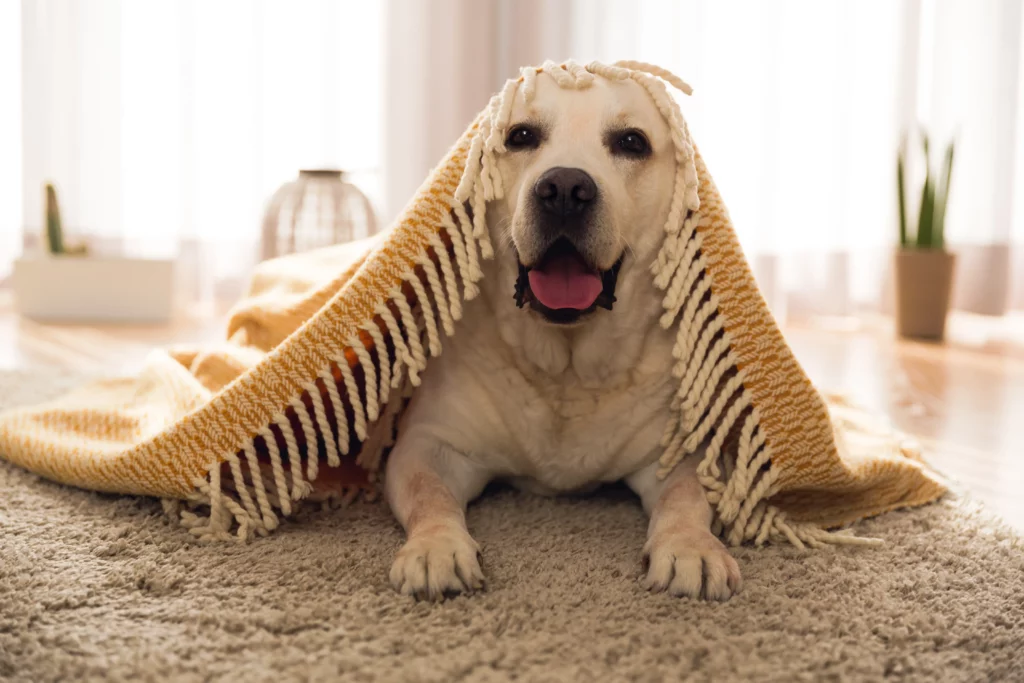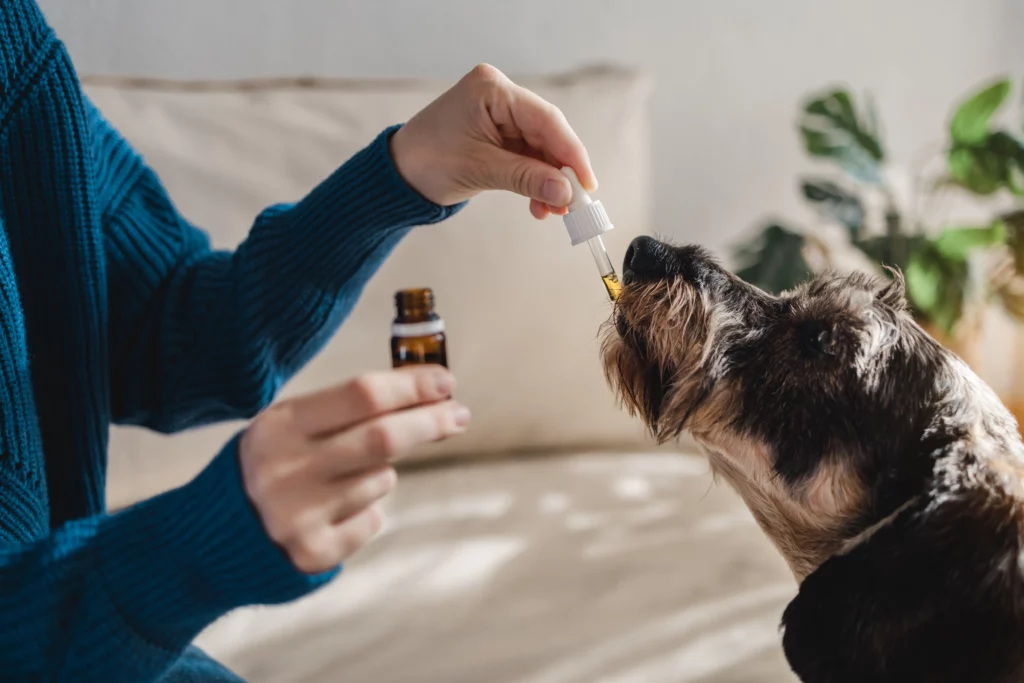
Skin rash on dogs is a common issue that dog owners face routinely. Estimates suggest that nearly one in five dogs will experience some form of skin allergies or rash in their lifetime.
These skin issues are not just uncomfortable for your canine companions, but they can also be indicative of more severe health problems if left untreated.
In this article, we will run you through three essential steps to help you tackle skin rash on dogs: recognizing the signs, seeking professional advice, and adhering to ongoing preventative measures.
Let's dive into these steps to ensure your furry friend stays happy and healthy!
First, it's crucial to identify the root cause of your dog's skin rash to tackle the problem.
For instance, treating a skin rash caused by an allergy with anti-parasite medication won't work. Once the root cause is known, proper treatment can alleviate symptoms and address the underlying problem.
Let's look at some of the most common triggers:
Learn: 6 Alarming Symptoms of itchy skin in dogs

A veterinarian can detect early signs of skin issues, identify potential allergens or parasitic infestations, and provide necessary vaccinations to prevent bacterial or fungal infections.
Regular check-ups also present an opportunity to discuss your dog's diet and environmental factors that could cause skin problems.
Hypoallergenic shampoos are a good choice for dogs with sensitive skin or allergies. If your dog has dry skin, consider a moisturizing shampoo.
Bathing your dog with a dog-friendly shampoo will keep your pet tidy and smelling pleasant and help manage skin conditions and relieve irritations.
Always avoid human shampoos, as they can disrupt the natural pH balance of your dog's skin and cause irritation.
Related: 6 Environmental Allergies in Dogs
The number of baths will depend on your dog's breed, lifestyle, and skin condition.
Generally, a monthly bath is sufficient for most dogs, but dogs with skin conditions or who spend much time outdoors might need more frequent baths.
Always consult your vet to determine the best bathing routine for your dog.
Discover The Best Skin and Coat Conditioner for Dogs
Regular brushing helps distribute natural oils, removes loose fur, and prevents matting. Brushing also allows you to check your pet's skin for signs of rashes, parasites, or infections.
Read: 6 Easy Steps For Dog Grooming at Home

A clean living environment contributes to overall skin health and can help prevent skin rash on dogs.
Washing Bedding and Toys: Regular washing of your dog's bedding and toys can remove allergens and parasites that may cause skin irritation. Use a pet-friendly detergent and make sure everything is thoroughly dried to prevent mildew.
Vacuuming and Cleaning Common Areas: Keeping the areas where your dog frequently spends time clean is also important. Regular vacuuming can reduce the presence of allergens and parasites in your home. Use pet-friendly cleaning products to avoid causing skin rashes and irritation.
An adequate, balanced diet can help nourish your dog's skin from the inside out, fortifying it against environmental aggressors and internal imbalances that can lead to skin rashes and other issues. Conversely, a poor diet lacking essential nutrients can lead to a dull coat, dry skin, and various dermatological problems.
Omega-3 fatty acids, commonly found in fish and flaxseeds, offer significant skin benefits for dogs. They have anti-inflammatory properties, which can help alleviate skin redness, itchiness, and swelling associated with rashes. Incorporating this essential fatty acid in your dog's diet can promote a glossy coat and healthy skin.
Protein aids tissue repair and maintenance, crucial for dogs suffering from rashes or other skin conditions. High-quality protein sources such as chicken, beef, fish, and eggs can provide this essential nutrient.
Hydration maintains skin elasticity and prevents dryness, which can lead to itching and skin rash on dogs. Ensuring your pet friend has constant access to fresh, clean water is a simple yet effective way to support their skin health.
While these general guidelines can be beneficial, it's crucial to remember that each dog has unique nutritional needs. That's why consulting with a veterinarian is invaluable for getting personalized dietary advice.
A vet can make specific diet recommendations based on your dog's breed, age, size, and overall health, helping you choose the best food and supplements to maintain healthy skin and coat.

Once veterinarians identify the cause of your dog's skin rash, they can initiate targeted treatment, which may involve over-the-counter treatments, prescription medications, home remedies, or a combination of these approaches.
Antihistamines and topical creams, available over-the-counter (OTC), can relieve common skin rashes by treating symptoms such as itching, redness, and swelling.
Remember, seeking veterinary advice before applying any OTC product is essential to ensure it's safe and suitable for your pet's condition.
In milder cases or as an adjunctive treatment, specific home remedies can be beneficial.
Aloe Vera and Oatmeal Baths
A bath with a shampoo containing aloe vera and oatmeal can help alleviate your dog's discomfort due to these’s natural soothing and healing properties.
Coconut Oil for Moisturizing
Applying coconut oil to your dog's skin can help alleviate dryness and flaking associated with skin rash on dogs.
Herbal Remedies like Chamomile for Soothing Effects
Chamomile can have calming effects on irritated skin. A chamomile tea rinse or a poultice can be a soothing treatment option for your dog's skin rash.
Your vet may prescribe medication to treat your dog's skin rash in more severe cases. It could include antibiotics for bacterial infections, antifungal medications for fungal rashes, or steroids for painful inflammatory conditions.
Always follow your vet's instructions for dosage and duration of treatment to ensure the effectiveness of the medicine and prevent potential side effects.
AniViva® Animal Health Serum is a specially formulated cosmetic skin conditioner and moisturizer designed to promote your pet's health. Enriched with a concentrated blend of Zinc, Copper, and Magnesium, this unique serum comes in a convenient spray pump bottle.
Suitable for a range of pets, including cats, dogs, horses, and other animals, AniViva® Animal Health Serum is a topical nutritional aid that can significantly enhance your pet's overall health. It mainly benefits their coat health and can efficiently address skin rash issues.
What sets AniViva® Animal Health Serum apart is its environmentally friendly formula. Free of oil and alcohol, minimizing the chance of skin irritation.
Regardless of the treatment method chosen, it's crucial to follow dosage instructions and consult a vet regularly. Overdosing or underdosing can lead to ineffective treatment or unwanted side effects.
Consulting your vet ensures that they safely, appropriately, and effectively monitor the treatment for your dog's skin rash.

Investing in prevention strategies is crucial for maintaining your dog's long-term skin health and preventing recurring skin rashes. Here are some key strategies to consider:
Regular veterinary check-ups can help detect early signs of skin issues before they escalate into more severe conditions. Preventive care, including vaccinations and routine skin examinations, can help keep your dog's skin healthy and rash-free.
Parasites are a common cause of skin rashes in dogs. Implementing a year-round parasite control plan, including regular flea and tick treatments, can help prevent infestations that lead to skin irritation and rashes.
Pay close attention to changes in your dog's behavior or skin condition, as these may be early signs of a developing skin issue. Frequent scratching, excessive licking, or the appearance of red patches could indicate a skin rash on dogs. Early detection and treatment can help prevent further discomfort and potential complications.
Managing and resolving skin rashes on dogs involves three pivotal steps.
Consistent care and attention are crucial in maintaining your dog's skin health, preventing future issues, and ensuring their overall well-being.
It involves regular vet check-ups, a year-round parasite control plan, and keen observation of your dog's behavior and skin condition for any signs of discomfort or rash development.
To all dog owners, we encourage you to stay proactive in maintaining and improving your pet's skin health. You can help your furry friend lead a happy, healthy, and rash-free life with patience, understanding, and a committed approach.
Remember, the best care is preventative care. Your dog's skin health, comfort, and happiness depend on it. Experience our AniViva® pet series here.



